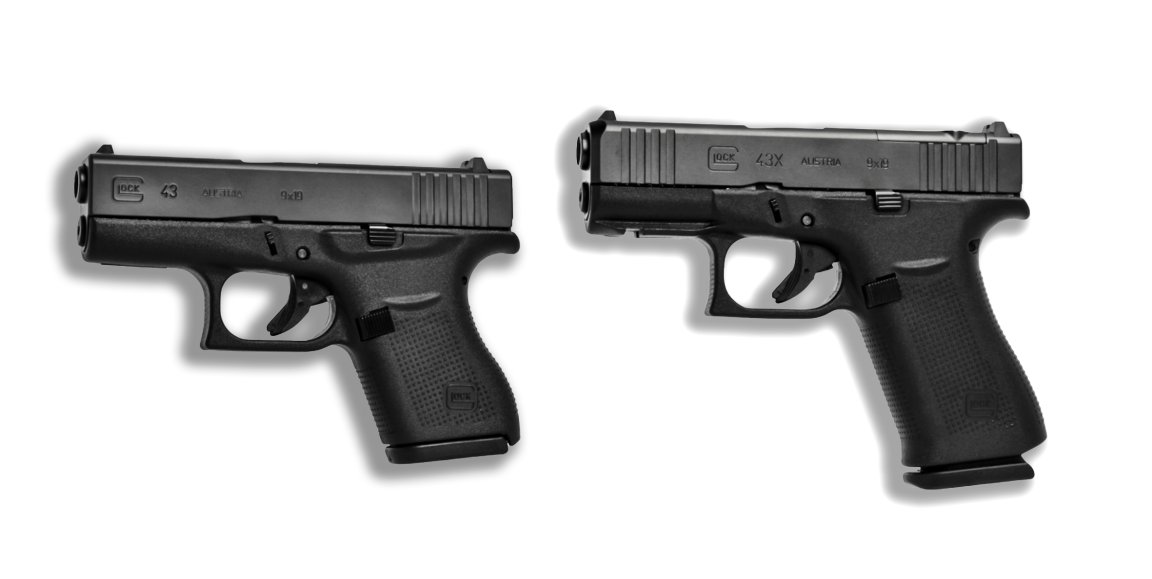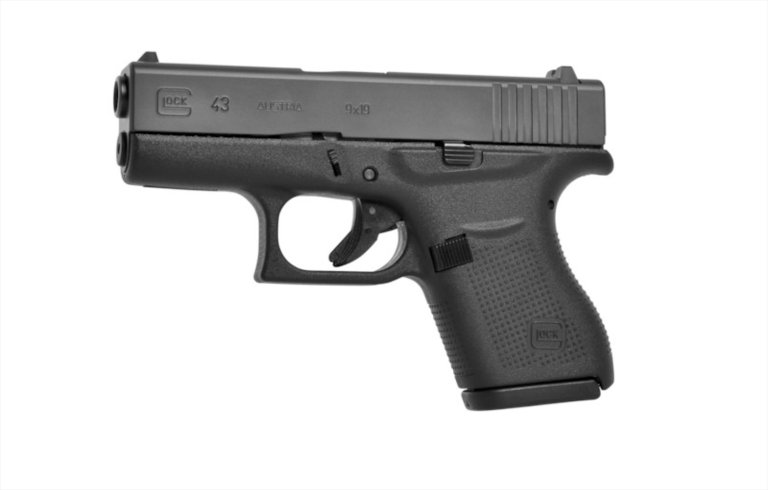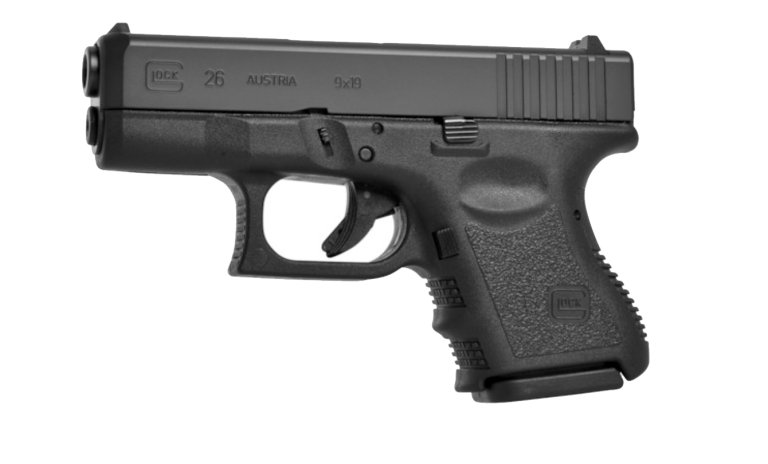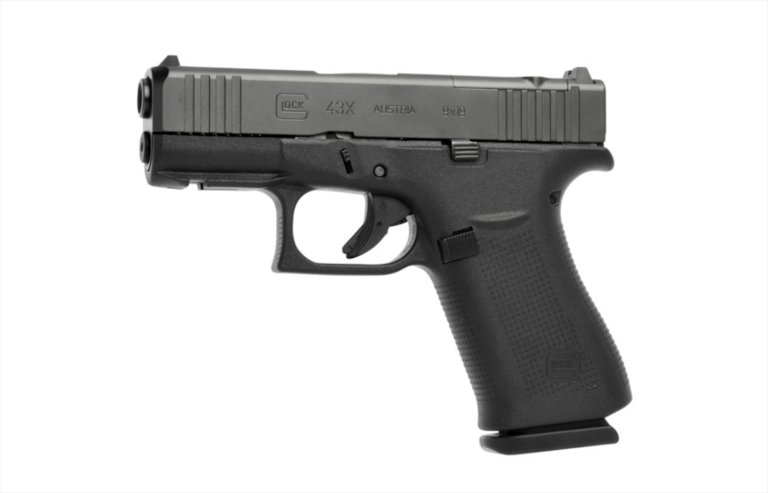We may earn revenue from the products available on this page and participate in affiliate programs. Learn More ›
When you’re having the Glock 43 vs. 43X discussion with a buddy, your spouse, or the person behind the gun counter, what you’re really talking about is handgun ergonomics. And to have a civilized discussion about the merits of both models, you have to understand why they were created in the first place when, technically, other Glock models already do what they do.
Gun-design innovations come in waves, and the micro-compact handgun surge of the 2010s wasn’t tidal, but it was pretty close. It changed the way people thought about concealed-carry handguns. Just about everyone who carried had to at least try out this ultra-concealable, high-capacity class of pistols like the Sig Sauer P365. Glock predictably entered the market, but the company was just a little late to the party.
Glock 43 vs. 43X Specs
| Glock 43 | Glock 43X | |
| Caliber | 9mm | 9mm |
| Action | Striker-fired | Striker-fired |
| Capacity | 6+1 rounds | 10+1 |
| Sights | Fixed | Fixed |
| Optics ready | No | MOS model available |
| Barrel length | 3.41 inches | 3.41 inches |
| Weight (loaded) | 20.64 ounces | 23.07 ounces |
| Frame | Polymer | Polymer |
| Slide length | 6.06 inches | 6.06 inches |
| Slide width | 0.87 inches | 0.87 inch |
| Overall width | 1.06 inches | 1.10 inches |
| Overall length | 6.26 inches | 6.50 inches |
| Height | 4.25 inches | 5.04 inches |
| Price | $439+ | $448+ |
The Niche Filled by the Glock 43
Glock has offered tiny 9mm handguns for a long time. The stumpy, chunky, double-stack Glock 26 was released back in 1994, which is ultimately a cut-down Glock 19 with a 10-round, flush-fit magazine.
The sub-compact has been popular — both as a backup gun and a concealed-carry pistol — with law enforcement for years because it has an absurdly short grip and can also use Glock 19 or Glock 17 magazines. It has been a big seller on the civilian CCW market, too. Glock released the updated G26 Gen5 in 2018, and the company is still cranking them out. Because of that double-stack mag, however, some customers consider the G26 a thick brick of a gun that’s just too much to jam into a waistband.
And while a G26 is far better than no gun or a jammed gun, most people find that model isn’t very comfortable to shoot for very long, especially when you’ve got large hands and snappy ammo. If you don’t want to train with your gun because it’s uncomfortable, you probably won’t, and that’s not good, either.
So, as Glock is wont to do, the Austrian gunmaker waited until 2015 to produce the much thinner Glock 43 single-stack in 9mm. It sacrificed Glock’s legendary mag capacity for a trimmer frame and slide. (The gun was released on the heels of the Glock 42, a single stack micro-compact in .380 ACP, which was in vogue at the time.)
Sure, the G43 is thin and concealable, but the mag only holds six rounds plus one in the chamber for a total capacity of seven. Even when the Glock G43 debuted there were plenty of guns about the same size with far better capacities than that. Today, there are even more.
The Glock G43 vs the G26
Still, the G43 is great for concealment. And despite the short frame (which is still a bit longer than the G26), a deep beavertail provides that nice, high grip Glock shooters are used to. Because of this, the G43 has a good reputation for accuracy, especially for such a small and light 9mm.
And that is really what the G43 vs G43X was, and is, selling: its ergonomics and concealability. But the pistol’s applications are limited and, because it’s a single-stack, it can’t use any double-stack Glock mags, so it’s locked into that 6-round capacity.
Let’s just compare the Glock G43 vs. the G26, which could run a 33-round Glock mag if needed. Apart from the capacity capabilities, the differences are minute:
- The barrels are almost identical: The G43 barrel is 3.41 inches long, and the G26 has a 3.43-inch barrel.
- The G26 is a bit heavier at 25.75 ounces with a loaded mag. The loaded G43 mag weighs in at 20.64 ounces thanks to less polymer and, yes, less ammo.
- The slide on the G43 is slimmer by less than 0.2 inches. Overall, at 1.06 inches, the G43 is exactly 0.2 inches narrower than the G26.
- The Glock G43, has a shorter length overall but is slightly taller than the G26
| Glock 43 | Glock 26 | |
| Caliber | 9mm | 9mm |
| Action | Striker-fired | Striker-fired |
| Capacity | 6+1 rounds | 10+1 (up to 33 rounds) |
| Sights | Fixed | Fixed |
| Optics ready | No | No |
| Barrel length | 3.41 inches | 3.43 inches |
| Weight (loaded) | 20.64 ounces | 25.75 ounces |
| Frame | Polymer | Polymer |
| Slide length | 6.06 inches | 6.26 inches |
| Slide width | 0.87 inches | 1 inch |
| Overall width | 1.06 inches | 1.26 inches |
| Overall length | 6.26 inches | 6.50 inches |
| Height | 4.25 inches | 4.17 inches |
| Price | $439+ | $499+ |
The G43’s advantages are enough that it became a big hit for Glock among the ever-growing number of concealed carriers in the U.S., and for Glock fans who pretty much buy anything and everything the company produces.
The Sig P365 vs. Glock 43
The idea behind the Glock 43 is nice in theory (again, an attempt to produce a more concealable, comfortable version of the G26) but that paltry 6-round capacity is too much of a sticking point for a lot of folks. Plus, there’s no MOS version of the G43, which means you can’t top it with a red-dot unless you’re willing to get it milled.
Meanwhile, along came the Sig P365 in 2018, which has since spawned a super-successful line of modular CCW pistols. It did everything the G43 did (and didn’t do), but better.
The P365 is more than a quarter-inch shorter overall than the G43, and it manages to do that with a barrel that’s just .3-inches shorter.

It’s also the same width as a G26, but the P365’s more ergonomic grip feels slimmer and certainly longer while holding a 10-round flush-fit mag. It can also rock 12-, 15-, and 17-round magazines with grip sleeves. This means you have the option of a low-profile carry with a 10-round mag inserted and, say, two 17-round mags on the belt. It can even run 32-round extended mags and 50-round drum mags.
The first P365 model wasn’t optics-ready, but that soon changed, and a number of grip frame options and slide options are now available from Sig and third-parties.
But it isn’t the pistol’s capacity that really won people over: It was how good the P365 feels and how well it shoots. In fact, the pistol’s ergonomics are so popular that the micro-compact 9mm has basically morphed into something like an ultra-trim full-sized pistol. First came the P365 XL and the P365-XMACRO, and more recently the new P365-FUSE, which ships with 17- and 21-round magazines.
Glock’s response, which must have been in the works before the P365 dropped, was an update to the G43: the Glock 43X. While Glock fans loved it and the version with the stainless-steel slide proved visually striking after years of all-black factory Glocks, the G43X also got a lot of ridicule for not being very innovative.
Glock 43X: A Single-Stack, Snub-Nosed Glock 19
The Glock 43X’s overall dimensions are closer to that of a P365, with a slide and barrel length identical to the G43, but with a longer grip that can accommodate a 10-round single-stack magazine. This, of course, makes the gun a bit taller and longer overall, but because of the single-stack, it’s still thin with a grip that, for most people, is much more comfortable for shooting while still excellent for concealed carry.
Additionally, customers found they liked the feel and manageability of a Glock with a longer grip and shorter slide while not noticing much of a difference in accuracy at defensive distances.
For years, customers have been cutting down the grips on their G17s for a full-size slide on a G19 length grip; the G43X’s configuration does the opposite. The Glock 43X is essentially a short-barreled, single-stack Glock 19; they have the same exact height and grip length. For some folks, that extra grip length means the 43X is too much to carry, but others considered it the perfect solution — especially after the optics-ready G43X MOS came out.

When you compare the Glock G43 vs the G43X, the G43X is so popular that it launched a new “Crossover” category of Glock handguns, along with another important addition: the Glock 19X. The model extension followed the same idea, but on a double-stack scale: a Glock 19 slide and barrel on a Glock 17-sized grip.
The G19X is a civilian version of the gun Glock submitted for the U.S. military’s XM17 Modular Handgun System competition. Later in 2018, the Glock 45 was introduced; It’s nearly identical to the G19X but without the coyote finish and other military-required features, including the lanyard loop on the grip. An optics-ready G45 MOS model soon followed.
Performance of the Glock G43 vs G43X

If you can’t get your entire dominant hand on a pistol’s grip, you’re simply not going to shoot it as well as one with a longer grip. Lots of practice can help you close this gap, of course, but it’s a tradeoff: concealability and carry comfort in exchange for shooting comfort and proficiency.
The G43X finds a middle-ground with its middle-of-the-road grip length and by incorporating a significant beavertail to add stability and help the shooter control recoil and muzzle flip.
I’ve shot both plenty, and can confirm this theory about the Glock G43 vs the G43x. The larger G43X is absolutely more comfortable and controllable, while the G43 makes me feel like I’m shooting a tiny gun. Still, I’ve shot small pistols that were much more difficult to get a handle on.
The Glock 43X is also easier to reload. That little bit of extra grip length allows the mag to drop free without having to adjust my shooting hand. On a G43, I have to at least lift my pinky to allow the mag to fall free while depressing the release at the same time.
Of course, both guns from the factory are built to Glock standards and function as one would expect. As far as concealability, on a large frame, the little extra grip on the G43X isn’t going to make a difference for most people, but on folks with narrow hips and no gut, it certainly could.
Where Do the Glock 43 vs 43X Stand Today?

A lot has happened since 2018 in the handgun world. When the G43X was released, its biggest competition was from guns like the SIG P365, which already boasted a larger capacity with even larger options. Soon after came the more affordable Springfield Hellcat with an 11+1 capacity and a 13+1 option.
Since then, a host of other options have been introduced at various price points, like the FN Reflex and the Taurus GX4, which costs less than $250.
Meanwhile, Smith & Wesson’s M&P 9 Shield Plus is certainly giving Glock and Sig a run for their money. Because it holds 10 or 13 rounds, it’s been a solid, time-tested choice. S&W also has the smaller M&P Equalizer in 9mm that holds 10, 13, or 15 rounds in its roster, as well as the often ignored single action, hammer-fired S&W CSX, plus the recently released Bodyguard 2.0 series in .380 Auto.
That single-stack limited capacity of the Glock 43X is what’s holding it and the Glock 43 back as micro-compact pistols remain popular. There are 15-round third-party mags for the G43X, but so far, there are no larger OEM mag options from Glock.
Read Next: The Best Glocks of 2024: A Complete Guide to Glock Pistols
In short, the only people who can be expected to choose a Glock 43 vs a 43X seem to be a cross-section Glock fanatics who won’t carry any other brand, and those who absolutely want the slim lines of the G43 family as opposed to the Glock 45.
For most shooters who are willing to pick the best pistol rather than a certain brand name, however, there are better options.



